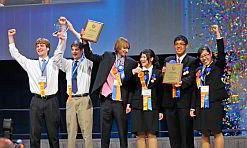
SA students tops at science awards
South African students Danielle Boer and Alessio Giuricich were awarded top prizes at the Intel International Science and Engineering Fair (ISEF) held in California on 13 May 2011. The two received awards for their innovative, independent research on dealing with social challenges through science. The ISEF is the world’s largest international high school science competition, which […]

South African students Danielle Boer and Alessio Giuricich were awarded top prizes at the Intel International Science and Engineering Fair (ISEF) held in California on 13 May 2011.

The two received awards for their innovative, independent research on dealing with social challenges through science.
The ISEF is the world’s largest international high school science competition, which provides a platform for grade nine to 12 students from around the world to present their independent research. Awards are made in the form of bursaries, scholarships and prize money.
Boer, from St Dominic’s Academy in Newcastle in KwaZulu-Natal, received a special nod in the sociology subcategory for her study on how to increase the productivity of factory workers by using music. She received a bursary worth R42 000 (US$6 063) to fund her tertiary education.
Giuricich from Bishops Diocesan College in Cape Town received R7 000 ($1 010) in prize money for winning the special award in the behavioural sciences subcategory for a project that studied sugar dependence among adolescents. He also came second in the Intel Grand Awards, taking home an additional R10 500 ($1 516).
Supporting innovation
The competition is jointly funded by Intel and the Intel Foundation, with additional awards and support from corporate, academic, and government organisations.
“We champion the Intel International Science and Engineering Fair because we believe that math and science are imperative for innovation,” said Shelly Esque, vice-president of Intel’s Corporate Affairs Group. “This global competition features youth trying to solve the world’s most pressing challenges through science.”
The two South African students beat over 7-million of their peers who competed in local science fairs with the hope of reaching the ISEF. Only 1 500 youngsters from around the world were invited to the ISEF to share their ideas and present their cutting-edge research, thereby standing a chance to win awards and scholarships.
“This global competition features youth trying to solve the world’s most pressing challenges through science, and we’re very proud of the South African learners who excelled in the international stage of the competition,” said Parthy Chetty, head of Intel SA.
Chetty credited hard work and gruelling hours of research on their projects as key to the students’ achievements.
ISEF chose their finalists from 443 affiliate fairs in 65 countries, regions, and territories, including, for the first time, France, Tunisia, United Arab Emirates and China. The number of finalists was whittled down through a tough assessment process.
The research was evaluate by hundreds of judges from a range of scientific disciplines, each with a PhD or the equivalent of six years of related professional experience in one of the scientific disciplines.
In addition to their prizes, the Intel Foundation also awarded a R6 921 ($1 000) grant to each winner’s school and the Intel ISEF-affiliated fair they represent.
ISEF is owned and administered by the Society for Science and the Public, a non-profit organisation dedicated to public engagement in scientific research and education.
“We congratulate the top winners for having the drive and curiosity to tackle these significant scientific questions,” said Elizabeth Marincola, president of Society for Science and the Public.
“Their work, and the work of all of the finalists at the Intel International Science and Engineering Fair, demonstrates what students can accomplish when they are inspired to pursue inquiry-based research.”
